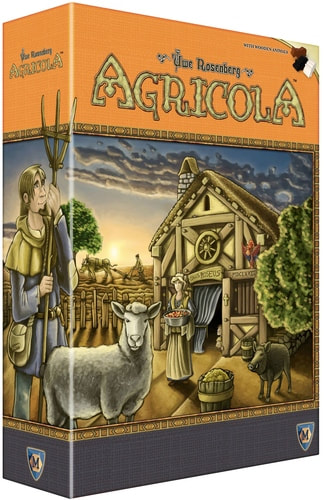 To watch a full solo playthrough of Agricola, click here. What is the game about? Agricola, designed by Uwe Rosenberg, is a worker placement game in which you grow your farm and your family as much as you can over the course of seven years (rounds). You can acquire building materials to add to and upgrade your house. You can acquire livestock, plough fields, and even take the "family growth" action—sexy! But be careful, because you need to pay attention to your food supply every year. You get "begging tokens" that decrease your score by every portion of food you fail to provide, and the years get shorter and shorter throughout the game. How does it play solo? In the multiplayer version of Agricola, competition stems from the fact that not only are you trying to score higher than others, but you are competing for limited action spaces on the board. Do you want to pick up some sheep, or vegetables to plant? If someone else has already used that space during that turn, too bad for you! In the solo version of Agricola, you are competing against yourself for higher and higher scores over the course of several rounds. To help boost you from round to round, you can keep occupations and get food bonuses that give you a head start. The solo mode turns Agricola into a puzzle where you are wringing every action for all that it's worth to see how high you can get your score to go. 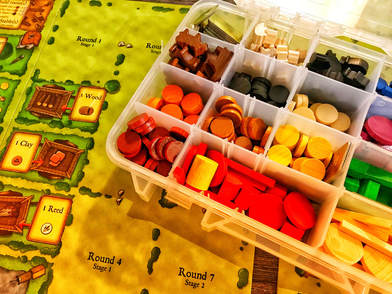 Agricola has a lot of pieces. I recommend getting a tackle box! Agricola has a lot of pieces. I recommend getting a tackle box! Overall Thoughts For me, Agricola is extremely absorbing. I love the satisfaction I feel as I watch my farm grow, or as I learn to exploit new occupations and generally maximize the resources provided to me. You can play the game with different sets of cards, meaning that you can experiment with different improvements to your farm and with different occupations that add a bit of variety to the game. However, Agricola can also get very repetitive, especially in the earlier rounds of a given game. Before long, I developed set patterns to follow in the beginning, which made the game less interesting over time. Agricola will give you a lot of pleasure when you are first playing it or when you come back to it after a break, but it's probably not going to sustain a solo player for all that long. You can definitely get to a point where you feel like you've "solved" Agricola, at least to a point where most of your decisions in the game are set before you even begin. Do I recommend it? For the joy that I got out of it during my initial obsession period, I recommend Agricola. It's a great choice for you if you're the type who will push for a high score again and again, or who likes to pick apart how different actions work together for maximum advantage. You will need to take a break from this game after your first big burnout, but there are enough different occupation and improvement cards to offer some variety over time. Also, if you want to keep solving the puzzle but you are tired of performing the same actions and moving the same animeeples around repeatedly during early rounds of the game, Agricola has a pretty good app that includes the solo campaign mode. It's easier to speed through the early turns that way. Definitely give it a shot if that sounds interesting to you. Overall Score: 3 stars Rating Scale: 5 stars — I love it! 4 stars — I really like it. 3 stars — I like it. 2 stars — It's okay. 1 star — Meh.
0 Comments
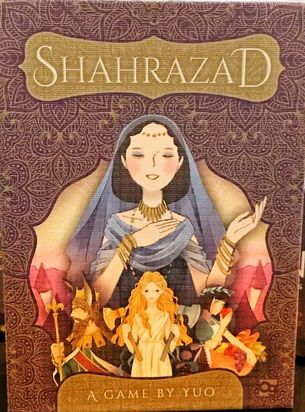 For a full playthrough of Shahrazad, click here. What is this game about? Shahrazad is an abstract tile laying game for 1–2 players. The premise of the game is that you are Scheherazade from 1001 Nights, and you are spinning a tale for your murderous husband. Your story, however, needs to be coherent—which means that you score based on how well the tiles that comprise your story "make sense." To simulate coherence in a story, the game requires that as you place your tiles in columns from left to right, numbers need to ascend (for example, you can't put the 17 tile to the right of the 18 tile). You also score points for making sure that cards of the same suit/color touch each other, a goal that symbolizes well-integrated themes within your overall story. The game is played in two rounds. After the first round, you calculate your score and remove any tiles that were improperly placed from the game. Then you reshuffle the remaining tiles and play a second round. Your combined score determines how well you did in the game. Coherence can be difficult to achieve. As you draw your story tiles—only two at a time—you need to place them in ways that ultimately create a properly woven tapestry of tiles. The order the tiles come up in changes every time, so you can end up with some terrible draws. If you want to change the placement of a tile, you can replace a tile in play with a tile from your hand, but you have to play two tiles the following turn. How does it play solo? Given that Shahrazad is explicitly designed for 1–2 players, it is custom built for low player counts. In fact, I would only bring out Shahrazad for solo play. Getting your tiles placed well is difficult enough without having to factor in another player's hand—especially because in the co-op rules, you aren't actually allowed to discuss what tile you should play before you make your choice. As a solo game, Shahrazad is a more meditative experience where you can relax and enjoy the art. Shahrazad is, at heart, an abstract game, so enjoying the art—and imagining what kind of story you are trying to tell—is key to turning it into something more thematic. 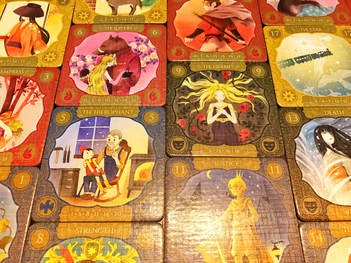 Shahrazad is definitely easy on the eyes. Shahrazad is definitely easy on the eyes. Overall Thoughts Shahrazad is not a bad game, but it's not a game you're going to play a million times in a row without getting tired of it. For the price and size, it makes an excellent work night or travel game. You can be done with it in as little as 15 minutes, if you're just playing it to get a game in. I also love the Arabian Nights theme and the beautiful art. That said, there isn't a ton of variety in the game. There are only 22 tiles in the whole thing, so before long you will have admired all of the art. From there, it's just the repetitive activity of drawing tiles and figuring out where to put them. If you get the game and experience burnout, put it back on your shelf for a few months and it should regain its appeal. (That is what happened to me!) Do I recommend it? If you want it for what it is, I recommend Shahrazad. Expect a cute, short puzzle that you can pull out when you want to get a quick game in. Overall Rating: 3 stars Rating Scale: 5 stars — I love it! 4 stars — I really like it. 3 stars — I like it. 2 stars — It's okay. 1 star — Meh.  As usual, I spent a bit of time this week messing around on Kickstarter and looking for games of possible interest. I am not backing any of these projects, but it makes me happy to see that there are so many solo-playable games on Kickstarter. The more game designers who cater to solo play, the better! Obsession This game is set in the world of Jane Austen, and it might be a good match for fans of Regency or Victorian England. The premise of the game is that your family estate is falling into ruin, but you've just acquired a sizable inheritance with which to repair it. The game seems to incorporate several different mechanisms and to have a lot of things going on at once. Deck building, worker placement, improvement tiles, and various ways of earning VP all have a role to play. I am not totally sure that everything will gel together well, but the theme of the game appeals to me, and I'll be keeping an eye out for reviews after backers have received their copies. The graphic design as displayed on the Kickstarter page also leaves much to be desired, but I don't always judge a book by its cover, or I never would have read Pride and Prejudice to begin with! 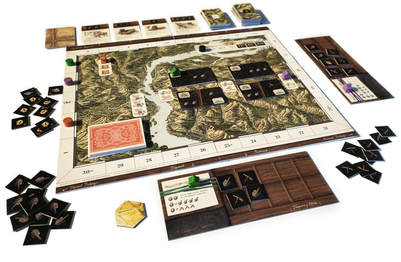 Claims of Gold In this game, you are trying to lay claim to a rich plot of land during the gold rush. To keep it for yourself, you need to mine the most gold. To do that, you place workers, claim actions, and push your luck just a bit in hopes of squeezing out every last bit of profit from your efforts. Although it is a worker placement game, Claims of Gold bills itself as an easy game to learn and play, even for non-gamers. It also has a relatively short projected length (30 minutes), which makes it possible as a filler or a relaxing game for work nights when you don't have the energy to play something intense. 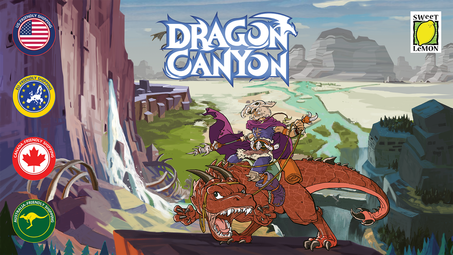 Dragon Canyon Dragon Canyon is a skirmish game for 1–5 players in which each player controls a tribe aiming for dominance and glory. Players must accumulate resources and maintain control over various territories. To gain resources, you can either use heroes to acquire them or have an outright battle with your fellow players to steal what they have. You can also eventually summon dragons, which sounds pretty good to me. Depending on stretch goal progress, you might also be able to connect with a spirit dinosaur. The solo version of this game will involve use of an AI deck, which will hopefully make for a quick and entertaining puzzle. 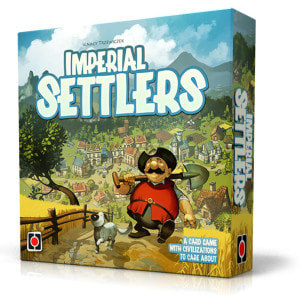 To see a full playthrough of Imperial Settlers, click here. What is this game about? After playing so much 51st State recently, I knew it was time to give some attention its close relative, Imperial Settlers. Like 51st State, Imperial Settlers is a card-driven engine building game in which you maximize the use of your resources in order to build the most expansive empire you possibly can. The theme, however, is deceptively cute—while 51st State is set in a post-apocalyptic America, in Imperial Settlers you can play as adorably illustrated Romans, Barbarians, Egyptians, or Japanese as you vie for control of new land. Expansions have also added the ability to play as the Aztecs or Atlanteans. In 51st State, all players draw entirely from a common deck of cards that represent the locations you can build, destroy, or make deals with. In Imperial Settlers, you work with a common deck and a faction deck. This gives the game some random elements, but also allows you to control your deck a bit better and to pursue specific strategies. Common location cards are also used as the foundations for faction locations, a mechanism which encourages you to develop properties in ways that were possible (but not required) in 51st State. 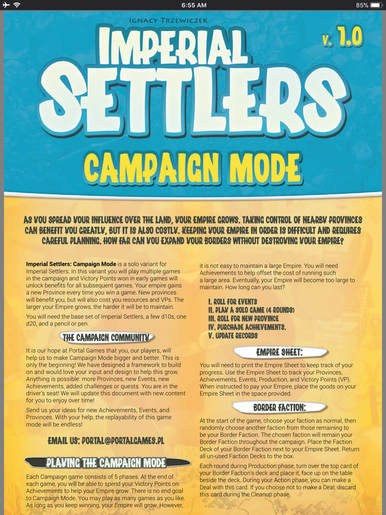 For an ideal solo experience, you need this. For an ideal solo experience, you need this. How does it play solo? Like its cousin, Imperial Settlers has rules for playing against an AI player who acquires locations and attempts to raze yours. Although I thought that the rulebook explanation for AI attacks was not very clear, once I understood what to do I liked how they work. In 51st State, it can be confusing to figure out which of your locations need to be razed because there might be multiple symbols on the cards that match. In Imperial Settlers, it's much more obvious which specific combinations of card symbols will lead to a successful attack on your empire. In fact, Imperial Settlers has much tighter rules in general, and that makes the game a lot more pleasant to play. There are only so many rounds in a game. Your goods tokens are used in more intuitive ways. The win conditions are a bit different because you only have to build enough faction locations to outnumber the common ones acquired by the AI—a choice that emphasizes how important it is to build, build, build. Of course, that choice turns victory points into a secondary concern in the base solo game, used only to calculate high scores. The presence of victory points as a secondary factor, not a win condition, could have been a problem for Imperial Settlers. It's not that tough to win a basic solo game, and victory points don't motivate every gamer to keep striving for greater victories. All of this might have been a problem, but for one thing: Imperial Settlers has a campaign mode. It was released online for free, and it provides an ongoing challenge that makes the solo game shine. Campaign mode is exciting and satisfying because it allows you to reap the rewards of skillful play over time. After each successive victory, your empire gains a province. Provinces bring rewards... but also upkeep costs. It's a delicate balance that adds a lot of drama to later games. Campaign mode also gives meaning to your victory points. Your VPs from earlier games can be spent on achievements—upgrades that give you advantages in future ones. Victory points are also, however, part of the cost to keep provinces. If you want to purchase more exciting achievements, you will want to earn as many VP as possible during each game. Giving actual purpose to the VP I earned in Imperial Settlers really made it work for me. The thrill of getting a tangible reward for performing well made me care about my VP count in ways that I typically don't if I am just earning them to go for a high score. I should also note that Imperial Settlers seems to be receiving plenty of ongoing support. It has seen several expansions since its 2014 release, including two new factions and several smaller packs that add fresh mechanics and include a couple of cards aimed at solo players. Overall Thoughts Imperial Settlers is an excellent game. I like the theme of 51st State better, but the design of Imperial Settlers is tighter, and the Latin teacher in me loves any game in which you can play as the Romans. Each faction plays differently enough to keep things interesting, and there is enough randomness in Imperial Settlers to prevent it from being a pure puzzle in solo mode. This means that sometimes the cards are going to screw you over, but I'm generally okay with that in board games. I'm also happy to see that Imperial Settlers continues to receive a healthy amount of support from Portal Games. To me, that indicates that this game will continue to stay alive and feel fresh for years to come, which makes it a good investment if you only want to own so many board games. I'd like to see Campaign Mode continue to receive interest and support as well, since that is what makes Imperial Settlers such a strong choice for solo players. Do I recommend it? Yes. The campaign mode is a necessity in my opinion, but with it, YES. If you like to build game engines and play around with card interactions, and if you can handle occasionally drawing a really bad hand of cards, this game is for you. Overall Rating: 4 stars Rating Scale: 5 stars – I love it! 4 stars – I really like it. 3 stars – I like it. 2 stars – It's okay. 1 star – Meh.  What are these games about? Valley of the Kings: Afterlife and Valley of the Kings: Last Rites are standalone expansions to Valley of the Kings, a small-box deck builder that I have reviewed previously. Valley of the Kings is a deck builder with a catch. You use cards to purchase other cards or to perform actions, as is typical of any other game in the genre. However, you can only score off of cards that you have "entombed," or removed from your deck to your personal stash before the end of the game. You get more points for having multiple cards from the same set. Afterlife and Last Rites follow the same basic formula, but offer new cards that perform different actions. The sets can all be played as standalone games, or cards can be mixed and matched to create new variations on the original theme. How do they play solo? Valley of the Kings: Afterlife and Valley of the Kings: Last Rites both have solitaire rules printed in their rulebooks. Rather than score points based on how many of each set you can collect, the solo version of the game requires the player to achieve a perfect score—one copy of each card in the game must be entombed before the end. Duplicate cards count against the final score, so you have to thin your deck in other ways. Once you become accustomed to the cards in each set, you can play the "master" level solo game. While in the normal game you receive one free entombment action each turn, when playing the master version you can only entomb cards via the actions on other cards. This definitely adds a level of challenge and forces you to really learn how to wring every drop of usefulness out of your cards. Overall Thoughts for Afterlife Valley of the Kings: Afterlife is a decent sequel/expansion that adds new variation to the original game if you have already come to know it well. There are definitely more cards that allow you to manipulate the boneyard (a place for cards that have been "sacrificed," or removed from the game). There are also more cards that impact other players, but sadly that is not a selling point for the solo variant. That said, I think I prefer the original Valley of the Kings. Afterlife offers the same starter cards, and it doesn't have too much of a different feel overall. It's still fun, and I enjoy it, but it's best understood as a purchase for people who already love Valley of the Kings and who need to freshen it up. It's also a good purchase for groups of players who enjoyed the first Valley of the Kings, but who wanted more player interaction. Overall Rating for Afterlife: 3 stars Rating Scale: 5 stars - I love it! 4 stars - I really like it. 3 stars - I like it. 2 stars - It's okay. 1 star - Meh. Overall Thoughts for Last Rites Last Rites feels like a different game from the moment you open the box. This is partially because it offers different cards to use in your starting deck, which completely changes how you play. The starting card actions added some spice back into the game for me, and I'd like to mix and match a bit with previous sets, just to see what happens. The cards in this expansion also allow more interaction with both the boneyard and the stock, which is definitely interesting. There is a lot of player interaction in this one, though, that does not quite carry over into the solo game. It's also a bit weird thematically. While in previous Valley of the Kings games you stashed various inanimate objects in your tomb, the sets that you collect in Last Rites are made up of people. It's a little disturbing if you think about it for too long... Overall, I would say that Last Rites is a better game than Afterlife, but the mechanics that it adds don't do as much for the solo player as they do for groups of players who want to interact with each other. For solo play, I still prefer the original Valley of the Kings. If you want to play with a group, Last Rites might be a better choice, although I can't say for sure. As a future project, I would definitely be interested in trying to find the best combination of cards for solo play! Overall Rating for Last Rites: 3 stars Rating Scale: 5 stars - I love it! 4 stars - I really like it. 3 stars - I like it. 2 stars - It's okay. 1 star - Meh. 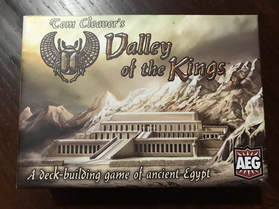 What is this game about? The tagline of Valley of the Kings, a small-box, Egyptian-themed deck builder, is "You can take it with you." The goal of this game is ultimately to acquire sets of cards (statues, canopic jars, sarcophagi, etc.) and entomb them—i.e. take them out of the game—for scoring at the end. Your cards, however, are good for more than being stashed away. They give you actions and purchasing power that are key to winning the game! What makes this game interesting is the tension between entombing cards and playing them. You need your cards to take actions and purchase more cards, but you also need to start thinning your deck early enough in the game. Otherwise, you'll get to the end and not have enough time left to stash away your stuff for the afterlife. How does it play solo? Valley of the Kings comes with an official solitaire variant. Its rules are on the Alderac Entertainment site, as well as printed in the rulebooks of the game's expansions, Afterlife and Last Rites. When playing solitaire, the goal is to get a perfect score, which means entombing one copy of every card in the game. Also, duplicate cards count against you, so you can't just conveniently entomb cards as a way of thinning out your deck. If you get familiar enough with the cards to make the main solo mode easy for you, you can also play at "master level," where you no longer receive one free entombment action per turn. Instead, you must use only actions on cards you acquire in the game. This restriction definitely adds to the challenge and forces you to learn your cards and manipulate them more efficiently. 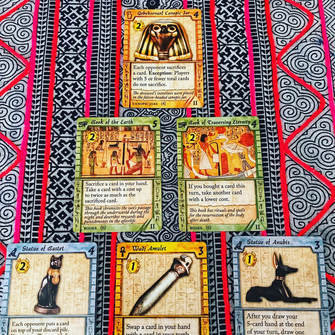 Overall Thoughts Valley of the Kings is a fun little deck builder with a creative variation on the usual deck building mechanics. The need to "entomb" cards means that you can't just concentrate on acquiring cards with exciting actions—you also need to choose the right moment to get them out of your deck. I also like that there are two ways to play solo. You can go with the more relaxing "standard" game, or go for the "master" level and really burn your brain figuring out how to maximize card abilities. There are some drawbacks, however. Many of the cards have actions that affect opponents or interfere with their plans, meaning that several of the cards you must acquire to win are partially useless to you. Also, without other players to interact with, you lose a little bit of the rush to acquire cards before others do. Additionally, while the ancient Egyptian theme is cool—and while many of the game's mechanics fit with the theme—theme and gameplay never fully intertwine. There are cool pictures and flavor text, but your mind will be occupied with card interactions and puzzle-solving without much connection to the theme. There are two standalone expansions to Valley of the Kings. The first is Valley of the Kings: Afterlife. The second is Valley of the Kings: Last Rites. My thoughts on those can be found here. Do I recommend it? Yes. If you like deck builders, Valley of the Kings is a good one. It's small, portable, and full of interesting choices. Overall Rating: 3.5 stars 5 - I love it! 4 - I really like it. 3 - I like it. 2 - It's okay. 1- Meh. Note: I wrote about Valley of the Kings in June of 2016, but I wanted to revisit the game and to review it in my new chosen format. For my first set of thoughts, click here. 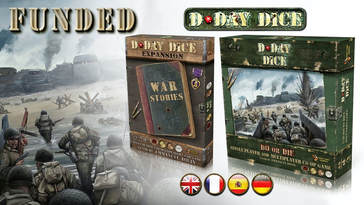 Hello from San Antonio! I am back in my hometown visiting family for a couple of days, but that doesn't stop me from perusing Kickstarter and getting excited about upcoming games. Here are a few of this week's interesting Kickstarter campaigns that cater to solo gamers: 1. D-Day Dice: 2nd Edition D-Day Dice is a classic solo game that has appeared on several lists of top solo board games. It's been on my radar for a long time, and I'm happy to see a reprint with an expansion. If you enjoy dice, games about war, and solo play, this one might be a good fit for you. I am interested to try it as a gamer who has been hearing good things about it for several years. 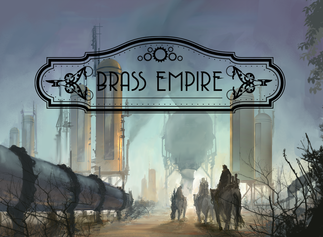 2. Brass Empire: New Canton Expansion + Reprint I love deck builders and I love story driven games, so there might be something really cool here. Brass Empire is a deck builder with a steampunk theme. The New Canton expansion will allow you to play through a campaign as a specific character, with the possibility of replaying the campaign from the point of view of other characters in the game. I am definitely intrigued by this one, although I wish there were more reviews of the first edition! (I like being able to look at several before taking the plunge.) Most of what I have seen makes Brass Empire sound like your standard deck builder, which is fine if you're into that. Generally, I am into that, and a campaign mode also sounds pretty interesting. 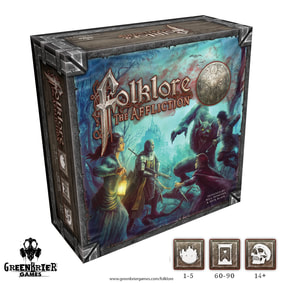 3. Folklore: The Affliction This one looks like a bunch of good, Ameritrashy fun. It's a reprint with an expansion, so Folklore is definitely doing it for some people. The character types look different, too—mages and clerics are fun, but it would be a novel thing to play as an archaeologist or a telepath. There are a few things holding me back from pledging, though. The first is the price. I just can't swing another expensive game right now! The second is that I have already bought into a bunch of fantasy-RPG-adventure type games that are on my to-play list. Gloomhaven is here, I still need to dig into Sword & Sorcery, and I went for the Gloom of Kilforth reprint. I'm a little overloaded at the moment. Last... well, the writing. I'm getting more sensitive to the flavor text in my games, and the line about a creature "who drinks the cherry blood of his guests" killed my immersion immediately. Cherry? Seriously? Sometimes it's a totally stupid thing that has the most impact on you. 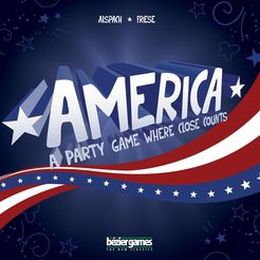 The holiday season is upon us, and that means that we need to get ready for hours of family time! To ensure that your "quality time" with relatives is quality without the quotation marks, I highly recommend that you play some board games. They keep everyone occupied with doing something together, but conveniently distract from possible conversations about religion and politics. Everybody wins. Of course, your family may not be full of gamers who are ready to throw down the moment somebody says Twilight Imperium (that one can take 6 hours with experienced players...). One of the keys to having a good time is choosing the right games. So how do you become a gaming sommelier to your grandmother who only wants to play the classics from her childhood? Check out my holiday gaming guide! For Families That Like Trivial Pursuit: I remember playing men vs. women Trivial Pursuit with my family and having a great time. My little brother enjoyed it less—the women usually won. However, I had no idea what most of the answers were. (I had never watched Howdy Doody or paid attention to sportsball. How the hell was I supposed to answer these questions??) Fortunately, modern game designers have found a solution to your problem! You can now play trivia games without having to be a walking encyclopedia! My first recommendation in this category is America. In this trivia game, you get credit for being close to the correct answer. You can also score by betting on other family members who probably know the answers—as well as for betting against people who you think are completely wrong. This is a trivia game that allows everyone to be involved even if they don't know all (or any of) the answers. It's the most accessible trivia game I know, and it does a great job of not making players feel bad about themselves when they should be having fun. I would also recommend Timeline, which is actually a whole series of games now. Go ahead and pick your flavor! You can try Timeline: Music and Cinema, Timeline: American History, or even Timeline: Science and Discoveries. In all versions, you try to play cards from your hand in the correct sequence in relation to other events, e.g. Which came first, Watergate or Woodstock? Even if you're wrong, you'll end up learning a lot, and you can actually make guesses instead of being flat-out wrong. 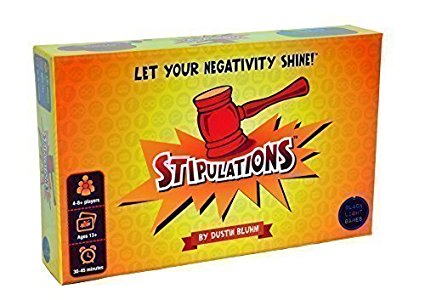 For Families That Like To Give Each Other A Hard Time: Do you ever feel like family gatherings turn into one big laugh at your many shortcomings? There is a way to channel that negative energy, and that way is... Stipulations. The tagline is "Let your negativity shine!" The concept of the game is that each round, one player chooses something good—a superpower, a lifetime supply of something, a fulfilled dream—and the rest of the players come up with a stipulation that would completely ruin it. If you've ever told your family that you started a YouTube channel about board games, then you know that they already know how to play this game. Plus, you get a chance to hold your own by ruining their dreams, too! Another good thing about Stipulations is that since you are coming up with your own responses, the game can be as G-rated or R-rated as you like. 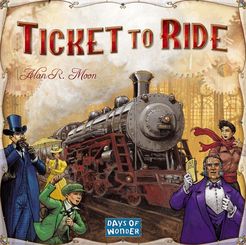 For Monopoly-Loving Families For families that have nearly murdered each other over Monopoly for generations, there are several less deadly alternatives. The first I would recommend is Ticket to Ride. It's got some of the same feeling of growth and development because you play as a railroad tycoon. However, there is no die rolling—only selection of different-colored train cards—and you have a lot more choice about how you want to play. Do you want to take risks and try to build ambitious train routes? Do you want to play more conservatively but also spend time blocking other people? The choice is yours! This game is easy to learn for players of all ages, and there are now plenty of "flavors" to choose from if you'd like to try train maps from different parts of the world. And for relatives who just feel more comfortable seeing the word "monopoly," I recommend Monopoly Gamer. It's faster, more entertaining, and highly appealing to kids because you play as familiar Nintendo characters. If Monopoly is too long for you, you should try this version. It's pretty fun and doesn't wear out its welcome before the game even hits the halfway point. 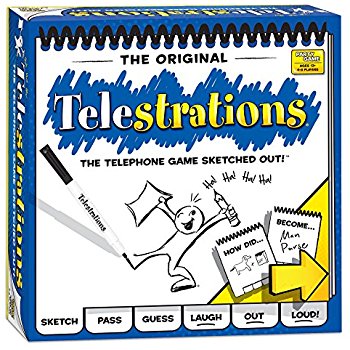 For Families That Prefer Pictionary If your family is more artistically inclined, I highly recommend Telestrations. Imagine a game of "telephone," but instead of interpreting what someone says, you are trying to understand what they were trying to draw. Mistakes will be made. This game is hilarious and can be played by family members of all ages. There is also a party pack that can accommodate up to 12 people, so it's fantastic for very large gatherings. If your family is a bit more devious, you can also try Fake Artist. In this game, you are all working together to create an image—but one of you is a "fake artist" who doesn't actually know what they are supposed to be drawing. All players know the category (e.g. animal), but the fake artist won't know what exactly you are supposed to be drawing (e.g. a cat). Everyone at the table takes turns adding to the drawing. The goal of the fake artist is to figure out what the drawing is supposed to be before he or she gets caught. Everyone else is supposed to add to the drawing in ways that don't give too much away—all while trying to identify the fake artist and convince everyone that it isn't them! Happy Holiday Gaming! I hope this little guide has given you some inspiration as you plan to spend time with the people who love you the most, but who possibly drive you the craziest. If there are any other categories of game you'd like recommendations for, leave a note in the comments! 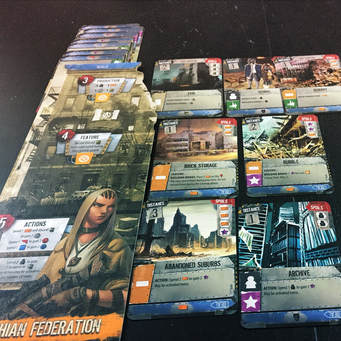 Your 51st State will grow! Your 51st State will grow! To see a full playthrough of 51st State: Master Set, click here. What is this game about? 51st State is an engine/tableau building game set in post-apocalyptic America. You represent a faction that is vying for dominance over this new "51st State." Each faction has different advantages, and you will need to use different strategies depending on which one you play. The goods you collect power different actions, all of which contribute to the growth of your state. Victory is determined by who has the most victory points at the end of the game. 51st State is also a card game: Players use cards from a common draw deck, but every card is usable in some way. You can raze cards in your hand (or in enemy states) for extra goods, you can flip cards to make "deals" with various locations and collect extra goods from them every turn, or you can build cards as "locations" that both give you points at the end of the game and offer additional goods, actions, or other bonuses. The amount of flexibility this game allows you is almost frustrating the first few times you play. How does it play solo? 51st State: Master Set has official solo rules that enable you to play against an AI opponent. This opponent is able to attack you and amass locations, which in turn allows it to amass victory points. You race the AI on the VP track, and final scoring happens when one of you hits 25 points. You then add points for the number of locations you have built and any bonuses they offer. Sometimes you get unlucky and the AI beats you. But solo 51st State is mostly a competition against yourself, with the AI as your timer. If you get pretty wily with the way you use your cards, you will be behind in the early stages of the game, but come back to get pretty far ahead of the AI player. 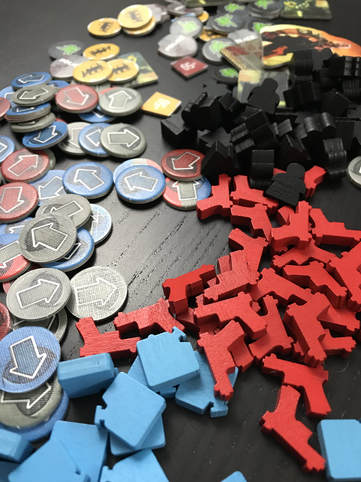 Overall Thoughts 51 State: Master Set makes for a satisfying solo gaming experience if you enjoy engine building. I derived the most pleasure from figuring out how to maximize my advantages and milk the game for every last resource or point I could get out of it. Because there are multiple factions to play, as well as cards from two 51st State expansions included in the master set, you will get enough variability to keep you busy for a while. I will say, however, that I found this game very difficult to play at first. The theme and art are awesome, but the theme and the mechanics don't necessarily work together intuitively. (Why do gas cans, but not other resources, help you get tokens that allow you to negotiate deals with other locations? Why do you have to trade pistols in for separate red tokens that allow you to attack, rather than just fire the damned pistol?) There are a lot of tokens and fiddly little actions to keep track of, and without obvious thematic anchors, I had a really hard time getting into the rhythm of the game. Once I got more accustomed to playing 51st State, I honestly enjoyed myself. But I feel like the barrier to entry might have been a bit too high for the game I got after investing the time and effort. Do I recommend it? If you enjoy creating a tableau, getting an engine going, and experimenting with different card interactions, then yes. I recommend 51st State: Master Set. If you get this game expecting some thematic, Ameritrashy fun, run away right now. Imperial Settlers: The Elephant in the Room 51st State: Master Set is very similar to another game from Portal, Imperial Settlers. The mechanics are similar, and the solo rules for 51st State are derived from the ones for Imperial Settlers, even though the first edition of 51st State came out before IS. The games naturally encourage comparison. My thoughts on Imperial Settlers are here. Overall Rating: 3 stars Rating Scale: 5 stars - I love it! 4 stars - I really like it. 3 stars - I like it. 2 stars - It's ok. 1 star - Meh. 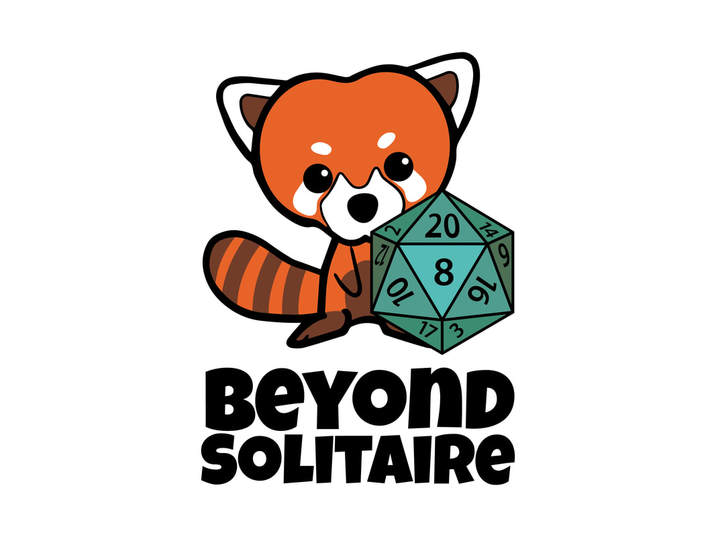 In January, I will have been writing on this blog for two years. Two years! The time has come to stop using my cat as my avatar (although she is an incredibly cute cat). It's time to have a logo. When I decided to do this, I wanted something that was cute, recognizable, and reflective of my love of solo gaming. Although I had a few different ideas, I ultimately decided I wanted to use a red panda. Like me, red pandas are red-haired solitary animals who are also very playful and curious. See evidence below: Unfortunately, I have zero skill as an illustrator, so I needed help to bring my logo to life. If you are in a similar boat, I highly recommend finding someone on Fiverr. Fiverr features several graphic designers who use a variety of styles. If you browse enough, you are certain to find someone who draws in a style you love and who will fit into your budget. I'm really happy with how everything turned out. I hope I enjoy my logo on this blog, Twitter, Instagram, YouTube, and everywhere else for many years to come! |
AuthorMy name is Liz Davidson, and I play solo board games. A lot of solo board games... Archives
August 2021
Categories
All
|
 RSS Feed
RSS Feed